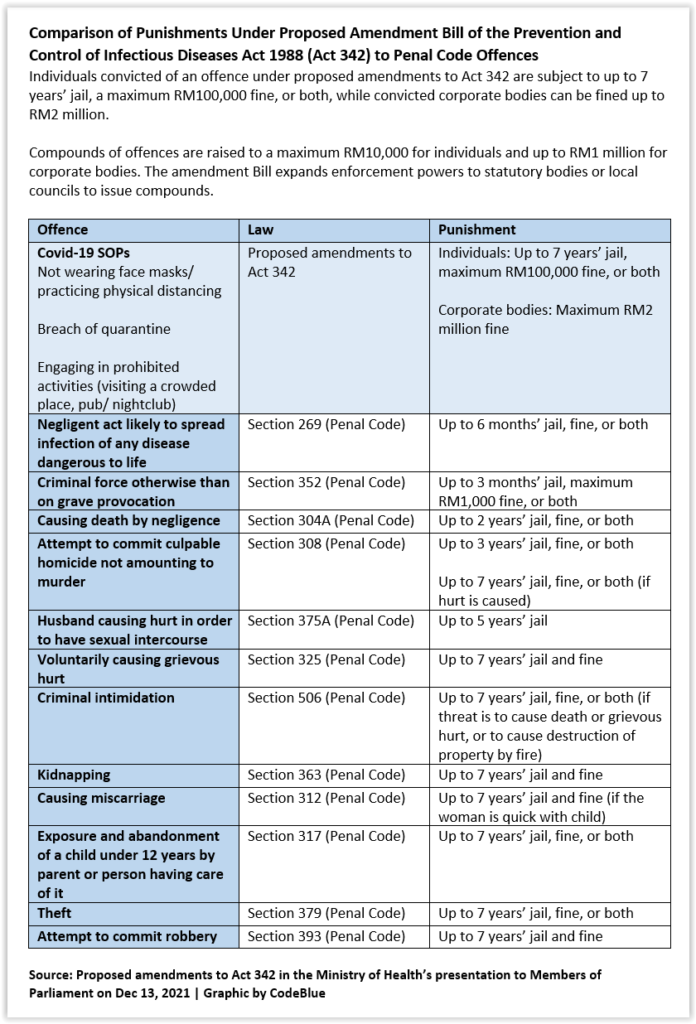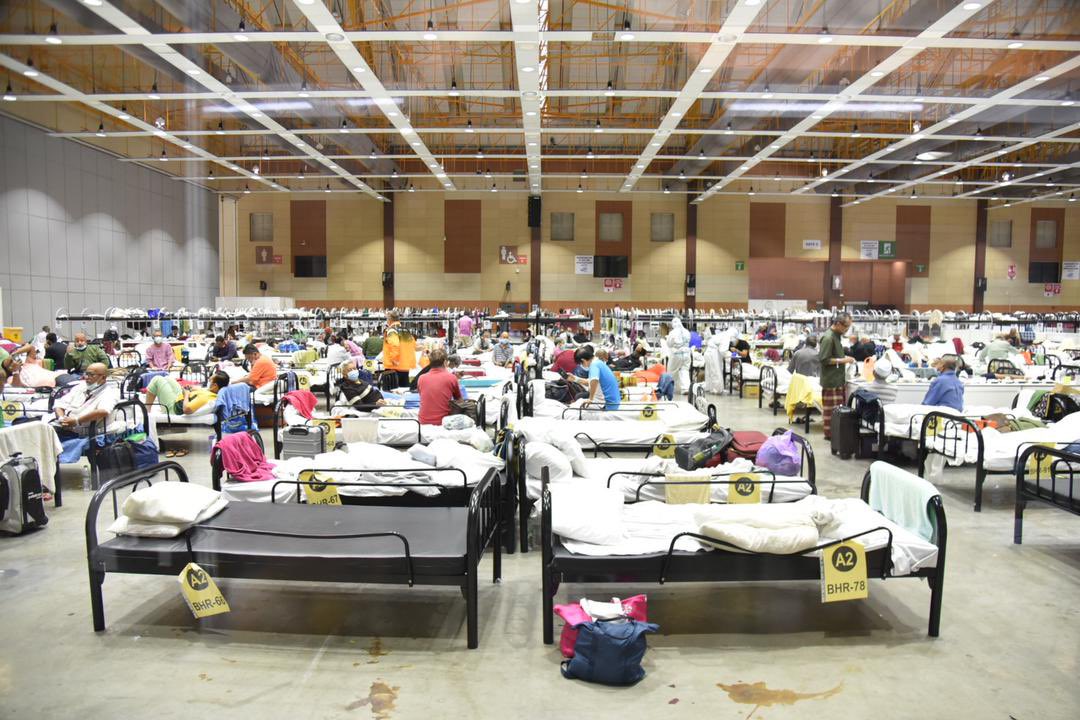KUALA LUMPUR, Dec 13 – The Health Ministry’s proposed amendments to the Prevention and Control of Infectious Diseases Act 1988 (Act 342) illustrate a draconian approach to managing Covid-19.
Not only are compounds of offences under Act 342 raised 10- to 1,000-fold from the current maximum RM1,000 compound, the amendment Bill also authorises the use of force to quarantine people suspected or confirmed to be infected with an infectious disease, based on the Ministry of Health’s (MOH) slides presented to lawmakers in Parliament today, as sighted by CodeBlue.
Under the amendment Bill, compounds of offences are raised to a maximum of RM10,000 for individuals and up to RM1 million for corporate bodies.
Act 342 — which regulates infectious diseases like HIV, dengue, and tuberculosis — is currently used to criminalise the breach of Covid-19 standard operating procedures (SOPs) like not wearing face masks, not practising physical distancing, breaching quarantine, and engaging in prohibited activities during the pandemic like being in a crowded place or visiting a pub or nightclub.
Individuals convicted of offences under Act 342 can be penalised with a maximum RM100,000 fine, up to seven years’ jail, or both under Section 24 on the proposed amended general penalties.
The new provisions will distinguish between individuals and corporate bodies. For companies and government agencies, the government has proposed a maximum fine of RM2 million upon conviction.
The aim of the punishment is to “prevent offenders from repeating the offence” and for others to avoid committing the same offence, the slides stated. However, it is up to the discretion of the court to penalise offenders.
Interestingly, Section 269 of the Penal Code imposes a lighter punishment of up to six months’ jail, a fine, or both for those convicted of a negligent act that is likely to spread infection of any disease dangerous to life.
Currently, general penalties under Act 342 stipulate that a person convicted of an offence is subjected to an imprisonment term not exceeding two years or to a fine or both, for the first offence.
For a second or subsequent offence, the penalty is imprisonment for a term not exceeding five years or a fine or both, and a further maximum fine of RM200 for each day during which the offence continues.

It is important to note that the maximum seven-year jail sentence for offences under the Act 342 amendment Bill is equivalent to punishment for voluntarily causing grievous hurt (Section 325 of the Penal Code); punishment for criminal intimidation to cause death, grievous hurt, or destruction of property by fire under Section 506 of the Penal Code; as well as theft (Section 379 of Penal Code).
Criminal assault is only punishable with maximum three months’ jail and a maximum RM1,000 fine under Section 352 of the Penal Code, while causing death by negligence (Section 304A of Penal Code) is punishable with up to two years’ jail.
Elsewhere in the Penal Code, an attempt to commit culpable homicide not amounting to murder (Section 308) can be sentenced to three years in prison. If hurt is caused, one can be punished with up to seven years’ jail.
Other amendments proposed to Act 342 include Section 14A that sets out the provision authorising enforcement officers to “use force if necessary” to ensure the quarantine, “at any place”, of individuals suspected or confirmed to be infected.
An explanation on MOH’s slide noted that there are cases of infectious disease directed for home quarantine, instead of mandatory isolation in a quarantine facility.
Section 15A of the amendment Bill enforces the use of tracking devices to monitor individuals suspected or confirmed to be infected. MOH’s explanation stated that this new provision was to enable the use of the latest technology to control the movements of individuals suspected or confirmed to be infected during quarantine.
Digital trackers are currently used to monitor international arrivals in Malaysia instructed to undergo home quarantine.
A proposed Section 22A imposes a presumption of guilt on corporate bodies, stating that an organisation is presumed guilty of an offence, unless it proves that the offence was committed without its knowledge or consent; and that the organisation had taken all reasonable measures and efforts to prevent the offence from being committed.
The Act 342 amendment Bill also expands enforcement powers to statutory bodies and local authorities. Under the proposed amendment to Section 2(1), a health officer is defined as any medical officer in the civil service or local council officers who undertake the work of a health officer in any area or district, including airports and land borders.
Section 2(1) defines an environmental health officer as any environmental health officer in government service or any local authority, including assistant environmental health officers.
Section 25 empowers officers from statutory bodies or local councils to issue compounds of offences.
“In the situation of an infectious disease pandemic with community transmission, MOH workers will focus on case investigation and contact tracing activities, besides undertaking disease prevention and control measures. Therefore, enforcement must be assisted by other officers with the power to issue compounds,” stated MOH’s explanation on its slide.
A proposed Section 21B under the new Part IVA on enforcement provides an enforcement officer the powers of investigation according to the Criminal Procedure Code, while Section 21C authorises an enforcement officer to compel information from anyone related to the prevention and control of infectious diseases.
Section 10 of the amendment Bill mandates all medical practitioners who get to know, or who have “reason to believe or suspect” the existence of any infectious disease in any premise, to inform the nearest health officer without delay.
MOH’s explanation slide stated that such information could be provided not just through a notice, but also emails, phone calls, and application systems like eNotifikasi, SIMKA, and the like.
Health Minister Khairy Jamaluddin will be pushing to pass the amendment Bill quickly before the current sitting Dewan Rakyat sitting ends this Thursday. The last Senate sitting for the year is on December 23.
MOH’s slides stated that amendments to Act 342 are crucial to maintain the continuity of enforcement powers under the Emergency Ordinance that was repealed on December 8.
“These amendments are to improve Act 342 based on experience related to legislation and enforcement during the Covid-19 epidemic to increase the effectiveness of enforcement to control and prevent the transmission of infectious diseases, especially the Covid-19 epidemic, after December 8, 2021. Therefore, it is necessary to immediately table and pass this Bill.”
Petaling Jaya MP Maria Chin Abdullah questioned the government’s rush to pass the Bill by Thursday, pointing out that the proposed legislation did not go through parliament’s select committee.








